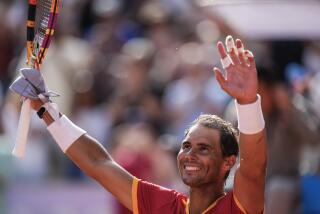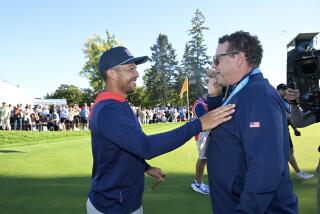U.S.-Russia matchup generates cold memories
- Share via
PORTLAND, ORE. — Just when it seemed as though the Cold War days were long gone, the dust has been blown off the old descriptive terms, a throwback to spy days.
Mysterious, and wily, holding a whiff of danger and conspiracy.
That is what tennis has wrought this season, becoming a beleaguered sport that saw almost all roads of controversy winding through Russia.
There were allegations of match-fixing (still unproven) with Russia’s top player Nikolay Davydenko, front and center, and the even more sensational charge of poisoning after Tommy Haas of Germany became sick and withdrew from the last day of action at the Davis Cup semifinals in Moscow. Russia, the defending champions, went on to win. The International Tennis Federation (ITF), however, concluded its investigation and found no evidence to support the charge.
The Russians are now here for the Davis Cup final against the U.S. and on Thursday only enhanced their reputation for intrigue, benching Davydenko for today’s singles matches.
Opening, at 1 p.m., will be Andy Roddick against Dmitry Tursunov of Russia followed by James Blake vs. Mikhail Youzhny at the Memorial Coliseum. The U.S. is attempting to win the Cup for the first time since 1995, and this is the first time it has played host to the final in 15 years.
Saturday’s doubles will feature twins Bob and Mike Bryan of Camarillo, who have lost only once in 13 Davis Cup matches, against the listed team of Igor Andreev and Davydenko. Few expect the Russians to stick with that lineup, including the Bryans, though Davydenko did play doubles with Andreev against France in April, winning in five sets.
As for Russian captain Shamil Tarpischev’s opening gambit, Tursunov said he only learned of the move shortly before Thursday’s draw ceremony, usually a predictable, staged affair.
“It was our captain’s Christmas gift for me,” he said.
Tarpischev, meanwhile, would only say the move to sit his team’s top-ranked player was made for “tactical reasons.” Blake and Roddick carry a combined 11-0 record against Davydenko, and Davydenko lost his two Davis Cup singles matches this year. Still, Davydenko is ranked fourth in the world, and even in the depths of the gambling scandal, found the strength to reach the semifinals of the U.S. Open.
Tursunov, ranked 34th, has not played in a Davis Cup singles match in 2007. He has an epic Davis Cup win on his resume, though, beating Roddick, 17-15, in the fifth set last year in the semifinals on clay at Russia, on Roddick’s worst surface.
While it would be easy to call this new-old Cold War, the references don’t quite resonate with the younger generation.
“Yeah, the only bad Russian I remember growing up was Drago against Rocky. Beyond that, I wasn’t up on my, you know, social politics at 3 years old. Most likely I was still reading the same books that I’m still reading today,” said Roddick, who referenced, jokingly, “The Little Engine That Could” in contrast to Blake’s Harvard “soliloquies.”
Said Blake: “It’s not necessarily the extra added motivation of beating any sort of evil guys. Like I said, I am friendly with some of the Russian guys. . . . I don’t feel like there’s as much of a tension as there may have been in terms of a ‘Rocky IV’ or in terms of the Cold War days. I don’t feel it’s the same environment anymore.”
The controversy about the poisoning allegations was defused when the ITF concluded its investigation last week. Grand Slam administrator Bill Babcock interviewed Haas and other members of the German Davis Cup team, including Alexander Waske, who sparked the probe when he said he was told by a player agent that the Russians poisoned Haas.
The gambling issue came to the forefront in August when suspicious betting patterns during a Davydenko match in Sopot, Poland, forced a British-based Internet site, Betfair, to void all bets. Since then, numerous players have come forward to say they had been approached to throw matches.
U.S. Davis Cup captain and ESPN commentator Patrick McEnroe, asked whether the long-running gambling investigation has cast a pall, noted that the sport is getting more attention for its problems.
“I think at this point, it’s more of a threat than an actual problem,” McEnroe said. “Whatever has happened, I’m sure we’ll move forward in a positive direction. So, I don’t think it’s casting a pall, to be honest. It’s kind of sad in the world we live in that tennis gets more attention because of this.”
The headlines and front-page stories have had more to do with allegations of match-fixing and poisoning in the latter half of 2007, instead of the brilliant shot-making of Roger Federer and Justine Henin.
“It’s a great pity,” said ESPN’s Mary Carillo. “Mostly for the fact in many news organizations it’s the only way tennis makes headlines. Henin isn’t compelling enough for many and Federer’s mastery of the sport is almost a foregone conclusion, so the grimier stuff seems to be almost a welcome relief to the non-tennis public.”
More to Read
Go beyond the scoreboard
Get the latest on L.A.'s teams in the daily Sports Report newsletter.
You may occasionally receive promotional content from the Los Angeles Times.











